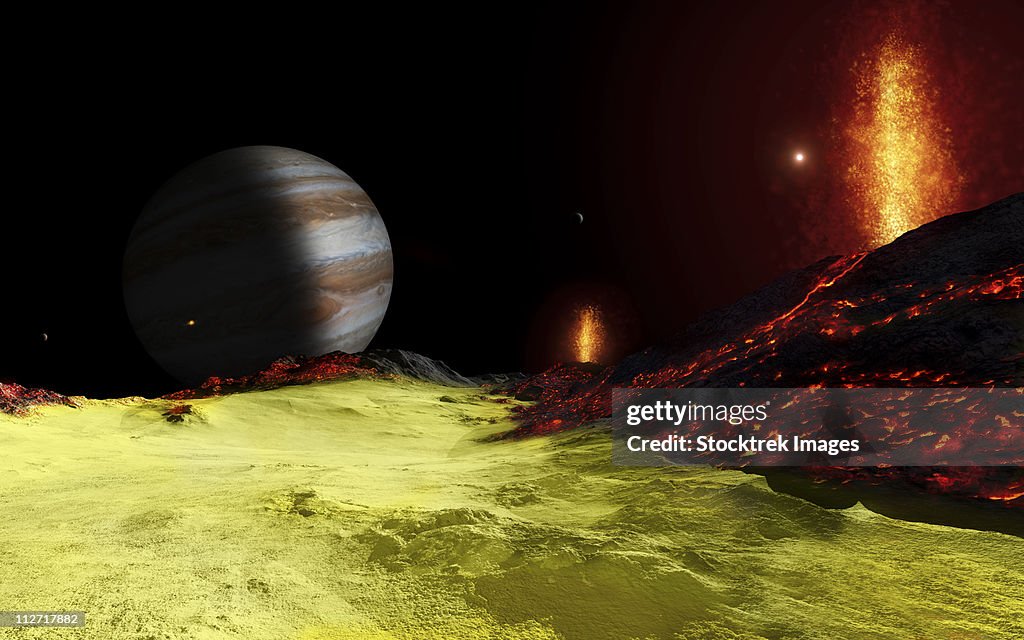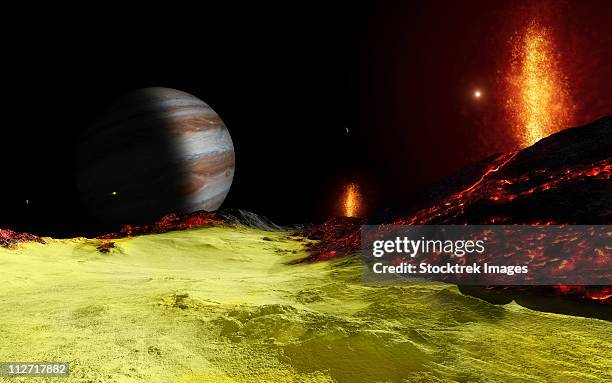Volcanic activity on Jupiter's moon Io, with the planet Jupiter visible on the horizon. - stock illustration
Io is the innermost of the Galilean moons orbiting Jupiter. Io is on average around 400 000 km away from Jupiter, which is approximately the same distance as our moon is from Earth. Jupiter looks 37 times larger than our full moon does in the night sky. Io faces great tidal forces from Jupiter, and the other three Galilean moons Europa, Ganymede and Callisto, which are tidally locked with respect to each other. At some places the tidal forces move the surface by as much as 100 meters up and down. This twists the moon inside out, but it is not because of this that the moon is the second hottest place (1 700 degrees C) in the solar system, next to the sun. Io's surface is being constantly bombarded by electromagnetic radiation from Jupiter. This radiation rips off about 1 000 kg of sulphur and other materials from the surface each second. This material (plasma) creates a physical bond between Jupiter and Io. As Io moves through Jupiter's magnetic field, it acts as a giant generator, inducing 400 000 volts and more than 3 000 000 amperes across Io's surface. Because of this bond, massive electrical discharges have been observed in Jupiter's atmosphere. More than 400 active volcanoes have been observed on Io, and the moon is known to change its' physical appearance over short periods (few years). An impact by an asteroid is seen on Jupiter's night side.

Get this image in a variety of framing options at Photos.com.
PURCHASE A LICENSE
All Royalty-Free licenses include global use rights, comprehensive protection, simple pricing with volume discounts available
€300.00
EUR
Getty ImagesVolcanic Activity On Jupiters Moon Io With The Planet Jupiter Visible On The Horizon High-Res Vector Graphic Download premium, authentic Volcanic activity on Jupiter's moon Io, with the planet Jupiter visible on the horizon. stock illustrations from 51łÔąĎÍř Explore similar high-resolution stock illustrations in our expansive visual catalogue.Product #:112717882
Download premium, authentic Volcanic activity on Jupiter's moon Io, with the planet Jupiter visible on the horizon. stock illustrations from 51łÔąĎÍř Explore similar high-resolution stock illustrations in our expansive visual catalogue.Product #:112717882
 Download premium, authentic Volcanic activity on Jupiter's moon Io, with the planet Jupiter visible on the horizon. stock illustrations from 51łÔąĎÍř Explore similar high-resolution stock illustrations in our expansive visual catalogue.Product #:112717882
Download premium, authentic Volcanic activity on Jupiter's moon Io, with the planet Jupiter visible on the horizon. stock illustrations from 51łÔąĎÍř Explore similar high-resolution stock illustrations in our expansive visual catalogue.Product #:112717882€300€40
Getty Images
In stockDETAILS
Credit:
51łÔąĎÍř #:
112717882
License type:
Collection:
Stocktrek Images
Max file size:
5376 x 3360 px (17.92 x 11.20 in) - 300 dpi - 10 MB
Upload date:
Release info:
No release required
Categories:
- Europa - Planetary Moon,
- Jupiter - Planet,
- Art Product,
- Astrobiology,
- Callisto,
- Color Image,
- Concepts & Topics,
- Digitally Generated Image,
- Emitting,
- Erupting,
- Exploding,
- Ganymede - Planetary Moon,
- Geology,
- Hill,
- Horizon,
- Horizon Over Land,
- Horizontal,
- Illustration,
- Illustration Technique,
- Impact,
- Io - Moon,
- Land Feature,
- Landscape - Scenery,
- Lava,
- Magnetic Field,
- Melting,
- Molten,
- Mountain,
- Mountain Range,
- Night,
- No People,
- Outdoors,
- Outer Space,
- Physical Geography,
- Planet - Space,
- Planetary Geology,
- Planetary Science,
- Radiation,
- Science,
- Shouting,
- Space Exploration,
- Steep,
- Sulphur,
- Volcanic Activity,
- Volcano,